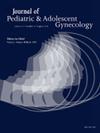11. 顺性青少年及其监护人性别肯定语言的知识与意识
IF 1.8
4区 医学
Q3 OBSTETRICS & GYNECOLOGY
引用次数: 0
摘要
背景:与同龄的顺性别同龄人相比,跨性别青少年更容易患上精神疾病,自残和自杀的风险也更高。来自同伴和家庭的社会支持,包括使用肯定性别的语言,已被证明可以防止这些不利的心理健康后果。我们假设青少年比他们的监护人更容易与性别肯定语言产生积极的联系。我们的目的是评估顺性青少年及其监护人对性别肯定语言的基线知识和意识,并检查青少年-监护人二人组中各自的一致性或不一致性。方法邀请14 ~ 21岁在儿科和青少年妇科门诊就诊的青少年及其监护人参与性别肯定语言的自愿调查。18-21岁的青少年在没有父母同意的情况下完成了调查。未收集受保护的健康信息。受访者通过平板电脑完成调查,并使用基于redcap的问卷。患者被要求自我报告他们的人口统计数据,包括年龄、种族、民族、教育程度和宗教。假设青少年对性别确认语言的接受率为25%,监护人对性别确认语言的接受率为12.5%,则需要152对受访者才能达到80%的权力。对分类数据采用卡方检验,对连续变量采用学生t检验,对每一代的汇总数据和成对数据进行分析。已获得机构内部审查委员会批准。结果青少年受访者更有可能拥有自己喜欢的代词(p<;0.0001)和认识到使用一个人喜欢的代词的重要性(p=0.002)相比,成人受访者(表1)。青少年也更容易接受被问及他们喜欢的代词,相对于成人受访者(p=0.001)。当将青少年与监护人进行对比时,这些问题具有统计学意义(表2)。自我报告的教育水平与拥有首选代词、接受被问及首选代词以及使用个人首选代词呈正相关(所有p<;0.05)。黑人种族也与偏好代词有关(p=0.03)。结论:与成年人相比,这个队列中的青少年表现出更强的性别肯定语言的重要性意识。本研究的局限性在于它是单一地点,可能不能代表所有患者群体。还进行了青少年和监护人在场的调查,这可能会影响其中一组或两组的反应。本文章由计算机程序翻译,如有差异,请以英文原文为准。
11. Knowledge and Awareness of Gender-Affirming Language Among Cisgender Adolescents and Their Guardians
Background
Relative to their age-matched cisgender peers, transgender adolescents are more likely to suffer from mental health disorders and are at higher risk of self-harm and suicide. Social support, including use of gender-affirming language, from peers and family has been shown to be protective against these untoward mental health outcomes. We hypothesize that adolescents are more likely to positively relate to gender-affirming language than their guardian. We aim to assess the baseline knowledge and awareness of gender-affirming language among cisgender adolescents and their guardian and to examine the respective concordance or dissonance within the adolescent-guardian dyad.
Methods
Adolescents aged 14-21 seen in the Pediatric and Adolescent Gynecology clinic and their guardians were invited to participate in a voluntary survey regarding gender-affirming language. Adolescents ages 18-21 completed the survey without parental consent. No protected health information was gathered. Respondents completed the survey via a tablet with access to a RedCap-based questionnaire. Patients were asked to self-report their demographics including age, race, ethnicity, extent of education, and religion. Assuming a rate of acceptance of gender-affirming language among adolescents of 25% and 12.5% among guardians, 152 dyad respondents were needed to reach a power of 80%. Aggregate data from each generation and paired dyad data were analyzed using a Chi-square test for categorical data and student's t-test for continuous variables. Institutional IRB approval was obtained.
Results
Adolescent respondents were more likely to have pronouns they prefer (p< 0.0001) and to recognize the importance of using a person's preferred pronouns (p=0.002) compared to adult respondents (Table 1). Adolescents were also more receptive to being asked their preferred pronouns, relative to the adult respondents (p=0.001). These questions were statistically significant when comparing adolescents to guardians in the paired dyad (Table 2). Self-reported level of education positively correlated with having preferred pronouns, being receptive to being asked their preferred pronouns, and utilizing a person's preferred pronouns (all p< 0.05). Black race was also associated with having preferred pronouns (p=0.03).
Conclusions
Adolescents in this cohort demonstrated a greater awareness of the importance of gender-affirming language compared to adults. Limitations of this study are that it is single site and may not be representative of all patient populations. Surveys were also obtained with both adolescent and guardian present which may have influenced responses from either or both groups.
求助全文
通过发布文献求助,成功后即可免费获取论文全文。
去求助
来源期刊
CiteScore
3.90
自引率
11.10%
发文量
251
审稿时长
57 days
期刊介绍:
Journal of Pediatric and Adolescent Gynecology includes all aspects of clinical and basic science research in pediatric and adolescent gynecology. The Journal draws on expertise from a variety of disciplines including pediatrics, obstetrics and gynecology, reproduction and gynecology, reproductive and pediatric endocrinology, genetics, and molecular biology.
The Journal of Pediatric and Adolescent Gynecology features original studies, review articles, book and literature reviews, letters to the editor, and communications in brief. It is an essential resource for the libraries of OB/GYN specialists, as well as pediatricians and primary care physicians.

 求助内容:
求助内容: 应助结果提醒方式:
应助结果提醒方式:


